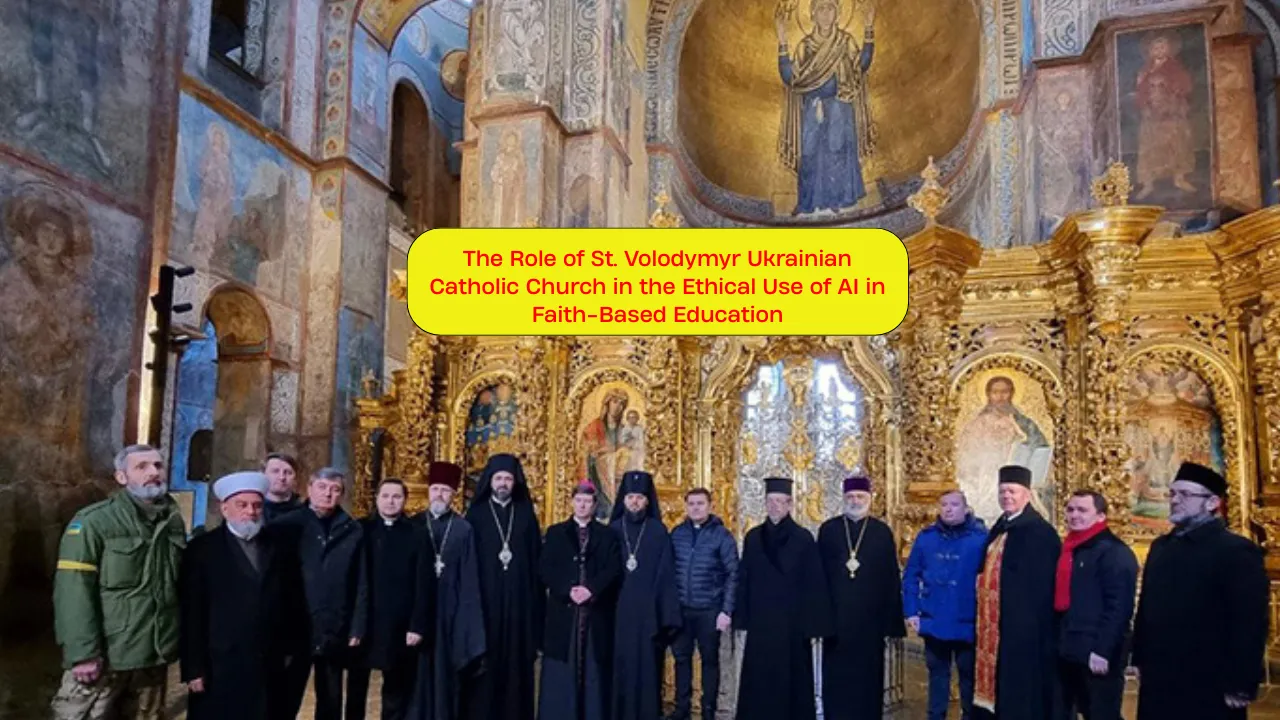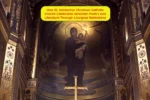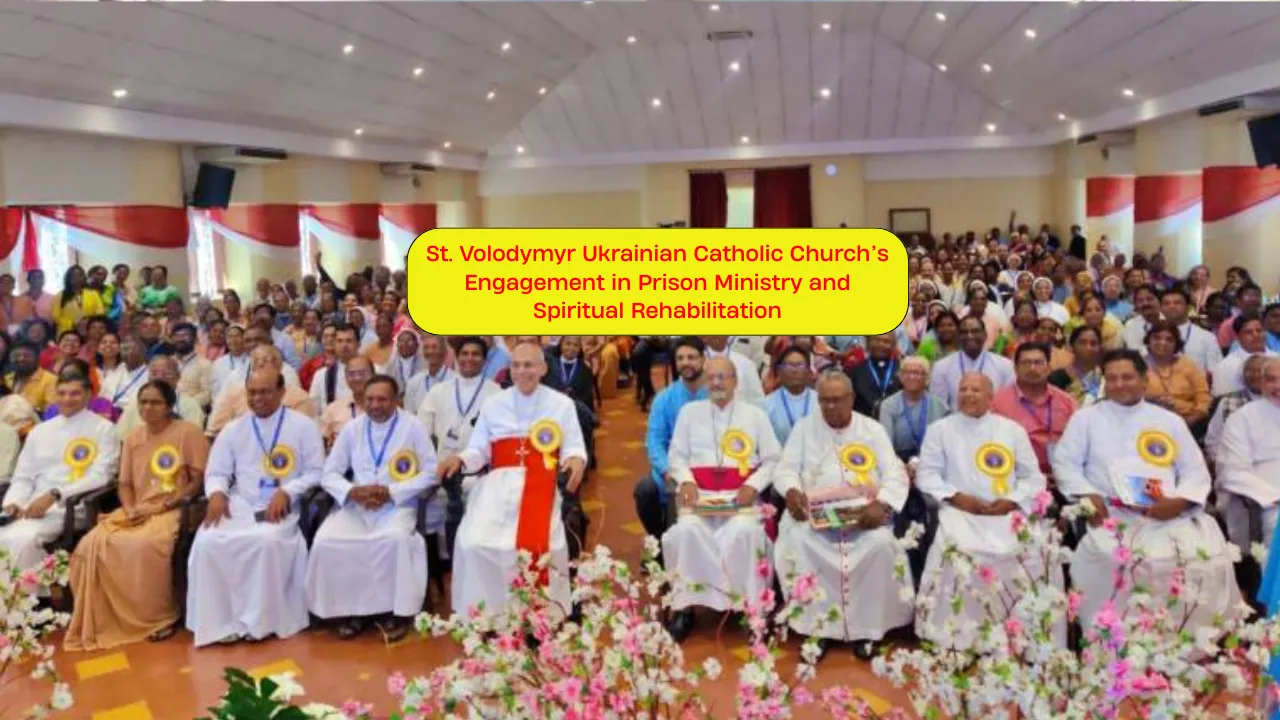Ethical Use of AI in Faith-Based Education is no longer a topic reserved for scholars or tech experts—it’s now a central concern for religious educators and communities navigating the evolving digital landscape. As artificial intelligence becomes more integrated into learning environments, churches and faith-based institutions are tasked with ensuring it supports, rather than disrupts, spiritual and moral formation.
This article dives into how St. Volodymyr Ukrainian Catholic Church has embraced this challenge, leading a thoughtful and grounded effort to guide AI integration in religious education. It highlights the church’s commitment to preserving core faith values while leveraging modern tools to enhance learning. We will explore their specific approaches, the challenges they face, and the broader implications for ethical technology use in spiritual education.
The Ethical Use of AI in Faith-Based Education
At the heart of the discussion lies a key concern: how can religious institutions use advanced technology like AI without compromising their core mission? The ethical use of AI in faith-based education means applying AI tools in a way that respects human dignity, promotes truth, and deepens spiritual understanding rather than replacing human wisdom or traditional teaching. St. Volodymyr Ukrainian Catholic Church sets a compelling example by ensuring all AI applications are filtered through a lens of morality, community values, and theological integrity. Their model offers a real-world example of how religious education can benefit from innovation while standing firmly on ethical ground.
Overview Table:
| Aspect | Description |
| Institution | St. Volodymyr Ukrainian Catholic Church |
| Focus | Ethical use of AI in religious education |
| Approach | Faith-guided, human-centered AI integration |
| Key Benefits | Enhanced learning, accessibility, spiritual engagement |
| Challenges Addressed | Bias, misinformation, privacy, over-reliance on technology |
| Community Involvement | Teachers, parents, clergy, and students |
| Educational Tools Used | AI-driven content, interactive platforms, translation tools |
Importance of Ethics in AI and Religion
Faith-based education is not just about teaching facts—it’s about shaping souls. That’s why the use of AI in this space demands more than just technical skill; it requires a moral compass. While AI can personalize lessons, translate scripture, or recommend prayers, it must never take the place of spiritual mentors or distort sacred teachings.
In religious instruction, digital tools must serve as helpers, not authorities. The ethical use of AI in faith-based education is about maintaining that balance. Misuse of AI—whether through incorrect interpretations of scripture or data privacy violations—can quickly erode trust and spiritual clarity. By emphasizing ethics first, St. Volodymyr ensures that AI supports spiritual formation, not distorts it.
St. Volodymyr’s Perspective on Technology and Faith
St. Volodymyr Ukrainian Catholic Church has developed a forward-thinking stance on the intersection of faith and technology. Their philosophy is simple yet profound: technology must serve humanity, and in their context, it must also serve God. They recognize that students today live in a digital world, and if faith-based education is to remain relevant, it must speak the language of modern tools—without compromising on values.
Rather than rejecting AI outright, the church embraces it with caution and care. They use AI-driven tools to support teaching efforts—like creating multilingual prayer materials or interactive theological quizzes—but these tools are always reviewed for accuracy and alignment with Catholic doctrine. The goal is to enhance Catholic education, not replace the teacher or spiritual guide.
Ways the Church Guides AI Use in Education
St. Volodymyr sets clear ethical boundaries to ensure that AI tools are implemented responsibly. Here’s how they do it:
- Spiritual Oversight Committees: Comprised of clergy, educators, and community members, these teams review all digital tools and AI-generated content before it is introduced into the classroom.
- Ethical Guidelines for Developers: When working with tech creators, the church insists on transparency, moral safeguards, and the inclusion of faith-based consultation during development.
- Ongoing Staff Training: Teachers and catechists receive regular updates on how to use AI tools responsibly in a classroom rooted in religious instruction.
These steps ensure a careful, value-based approach to AI—anchored in spiritual wisdom and modern awareness.
Benefits of AI in Religious Learning
With ethical boundaries in place, AI offers several advantages that can make religious education more effective and inclusive:
- Personalized Spiritual Learning: Students can receive material that matches their spiritual maturity and learning style.
- Multilingual Access: AI helps in translating prayers, scripture, and lessons, making content accessible to global learners.
- Improved Engagement: Interactive tools like quizzes and guided reflections keep students engaged while deepening understanding.
- Support for Educators: AI handles repetitive tasks, allowing teachers to focus on mentoring and spiritual guidance.
These benefits make AI a useful tool in faith-based learning, especially when paired with the discernment and presence of religious educators.
Key Ethical Principles the Church Promotes
- Human Dignity First
Every student is seen as a soul, not just a data point. AI tools must respect that spiritual and human identity. - Truth and Accuracy in Religious Content
Only theologically approved material should be distributed. AI must not misrepresent scripture or doctrine.
These principles act as guardrails, keeping the technology aligned with sacred values and community trust.
Challenges in Ethical AI Use
Despite their proactive approach, St. Volodymyr is not immune to challenges. They actively confront several risks:
- AI Bias and Misinterpretation: Religious texts are nuanced; AI may not fully grasp or accurately reflect theological truths.
- Data Privacy: Especially in schools, protecting students’ information is critical. Any AI tool must comply with strict privacy standards.
- Overdependence on Technology: The church works to ensure AI enhances but doesn’t replace personal prayer, mentorship, or scripture study.
These concerns are taken seriously, and policies are in place to reevaluate tools regularly.
How the Community is Involved
A standout feature of St. Volodymyr’s approach is how deeply the community is involved in shaping their AI use policies. This includes:
- Workshops for Parents and Teachers
Held quarterly to discuss updates in technology and faith-based teaching. - Feedback Loops with Students
Students are encouraged to share their experience with digital tools, making them active participants in shaping their learning. - Shared Ethical Discussions
Open forums are held where faith and technology are discussed in light of community values and church teachings.
These steps create a culture of shared responsibility, ensuring responsible AI use remains central to their mission.
Two Key Practices Adopted by St. Volodymyr
- AI Literacy Workshops for Educators and Families
These sessions empower teachers and guardians to understand both the benefits and risks of AI, especially when used for religious instruction. - Regular Review of Digital Teaching Tools
The church mandates bi-annual reviews of all AI tools used in classrooms, ensuring they continue to reflect doctrinal accuracy and community values.
FAQs
What is the ethical use of AI in faith-based education?
It’s the practice of using AI in religious learning while ensuring it aligns with spiritual values, respects human dignity, and supports—not replaces—human instructors.
How is AI used in Catholic education at St. Volodymyr?
AI supports lesson planning, language translation, and personalized learning, but all tools are reviewed by ethical committees to ensure spiritual integrity.
What risks come with AI in spiritual education?
Potential risks include misinterpreting religious texts, data privacy issues, and reducing human connection in spiritual growth.
Are AI tools replacing religious educators?
No. St. Volodymyr emphasizes that AI is only a supplement. Human instructors remain essential to spiritual and moral development.
How can parents get involved in monitoring AI use?
Parents are invited to participate in workshops, forums, and oversight discussions to ensure transparency and shared responsibility.
Final Thought:
In an age where artificial intelligence is reshaping how we learn, churches like St. Volodymyr Ukrainian Catholic Church remind us that technology must be grounded in values. Their approach to the ethical use of AI in faith-based education shows that innovation and tradition don’t have to be at odds. With the right guidance, AI can enrich spiritual learning while keeping the human soul at the center.
How does your community balance technology and tradition? Share your thoughts and explore more insights on faith, ethics, and education.












